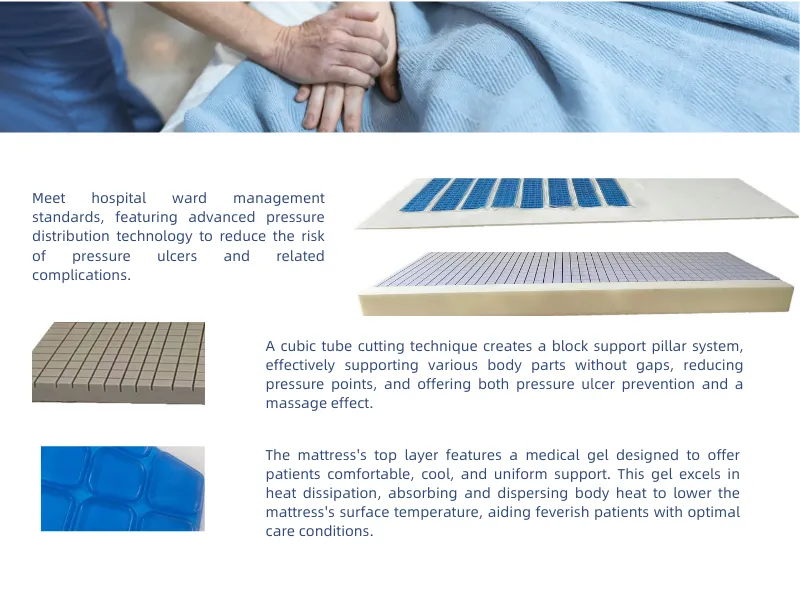medical mattress for bed sores products
Medical Mattresses for Bed Sores Prevention and Treatment
Bed sores, also known as pressure ulcers or decubitus ulcers, are a significant health issue, particularly for individuals with limited mobility. These sores develop when sustained pressure on the skin reduces blood flow to the area, resulting in tissue damage. To combat this issue, medical mattresses designed specifically for preventing and treating bed sores have emerged as essential tools in both hospital settings and home care environments.
Understanding Bed Sores
Bed sores typically develop in bony areas of the body, such as the heels, elbows, hips, and tailbone. They can range from mild redness to more severe, open wounds that can lead to infections. The risk factors for developing bed sores include immobility, poor nutrition, moisture, and skin friction. For patients who spend extended periods lying down, effective prevention strategies are crucial, and choosing the right medical mattress can be a game changer.
The Role of Medical Mattresses
Medical mattresses are designed with the primary goal of alleviating pressure on the skin while providing comfort. These mattresses come in various materials and technologies, each offering unique benefits to cater to different needs.
1. Foam Mattresses High-density foam mattresses are among the most commonly used for pressure relief. They distribute body weight evenly across the surface, reducing pressure on vulnerable areas. Some foam mattresses are contoured, providing additional support to the body's natural curves.
2. Alternating Pressure Mattresses These sophisticated systems use air cells that inflate and deflate in a programmed sequence. By shifting pressure points regularly, these mattresses help to improve blood circulation and reduce the risk of developing bed sores. They are particularly beneficial for patients at high risk of pressure ulcers.
3. Gel Mattresses Gel-infused mattresses combine foam with gel materials to enhance comfort and pressure distribution. The gel helps to dissipate heat, keeping the skin cool and dry—factors that are crucial in preventing moisture-related skin issues.
4. Water-Filled Mattresses Some medical options utilize water to provide a supportive cushion. These mattresses conform to the body shape and help evenly distribute weight, which can be very effective in preventing pressure sores.
medical mattress for bed sores products

5. Hybrid Mattresses Combining different technologies, hybrid mattresses offer a balance of support and comfort. They may feature layers of foam, gel, and air, adapting to various pressure points and providing an optimal sleeping environment.
Additional Features to Consider
When choosing a medical mattress, it is essential to consider several factors beyond just the material
- Size and Fit The mattress should fit the bed frame properly to prevent any gaps that might allow for movement and potential injury. - Weight Limit Ensure the mattress can support the weight of the user without compromising its integrity or effectiveness.
- Ease of Cleaning Many medical mattresses come with removable, waterproof covers that can be washed, which is vital in maintaining hygiene and preventing infection.
- Cost and Warranty While investing in a quality mattress may require a significant upfront cost, the benefits in health care savings and improved quality of life can justify the expense. Additionally, check for warranties that provide coverage against defects.
Conclusion
Preventing and managing bed sores is a critical concern for health care providers and caregivers. Medical mattresses play an essential role in this effort by offering various solutions tailored to meet the needs of those at risk. By choosing the right type of mattress, caregivers can significantly enhance the comfort and safety of patients, reduce the incidence of bed sores, and improve overall well-being. As technology advances, continuous innovations in medical mattress design will provide even more effective options for preventing pressure ulcers, emphasizing the importance of ongoing education and investment in patient care.
Consider discussing with medical professionals to find the best mattress suited for individual situations, ensuring a proactive approach to skin health for immobile patients.
-
The Effect of Coconut Foam Mattress Breathability and Humidity Regulation on Improving Sleep QualityNewsJul.03,2025
-
How Wave Mattress Systems Improve Blood Circulation During ImmobilityNewsJul.03,2025
-
The Climate-Adaptive Sleep Revolution: Exploring the Benefits of Cooling Gel Memory Foam MattressesNewsJul.03,2025
-
Exploration of the Role of Coconut Foam Mattress in Preventing Bedsores in the ElderlyNewsJul.03,2025
-
Comparing Wave Mattress and Air Mattress: Which Is Better for Medical Use?NewsJul.03,2025
-
Analysis of Comfort and Environmental Performance of Natural Latex and Coconut Foam MattressNewsJul.03,2025
-
Multi-Layer Construction for Enhanced Performance in Gel Mattress PadNewsJun.24,2025

